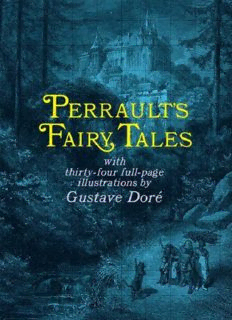
Perrault’s Fairy Tales PDF
Preview Perrault’s Fairy Tales
Copyright © 1969 by Dover Publications, Inc. All rights reserved. This Dover edition, first published in 1969, contains the eight stories of Charles Perrault published in Histoires ou contes du temps passé, avec des moralitéz, Paris, 1697. Translations of stories are from Old-Time Stories told by Master Charles Perrault, translated by A. E. Johnson, published by Dodd Mead & Company in 1921. Translations of verse morals are from Perrault’s Fairy Tales, newly translated by S. R. Littlewood, published by Herbert & Daniel, London, in 1912. This Dover edition includes thirty-four full-page illustrations by Gustave Doré from the volume Les Contes de Perrault, dessins par Gustave Doré, originally published by J. Hetzel, Libraire-Éditeur, Paris, in 1867. DOVER Pietorial Archive SERIES This book belongs to the Dover Pictorial Archive Series. You may use the designs and illustrations for graphics and crafts applications, free and without special permission, provided that you include no more than four in the same publication or project. (For permission for additional use, please write to Dover Publications, Inc., 31 East 2nd Street, Mineola, N.Y. 11501.) However, republication or reproduction of any illustration by any other graphic service whether it be in a book or in any other design resource is strictly prohibited. International Standard Book Number 9780486117584 Manufactured in the United States by Courier Corporation 22311624 www.doverpublications.com THE SLEEPING BEAUTY IN THE WOOD, page 1 LITTLE RED RIDING HOOD, page 23 BLUE BEARD, page 31 THE MASTER CAT, or PUSS IN BOOTS, page 45 THE FAIRIES, page 59 CINDERELLA, or THE LITTLE GLASS SLIPPER, page 65 RICKY OF THE TUFT, page 79 LITTLE TOM THUMB, page 91 Table of Contents Title Page Copyright Page THE SLEEPING BEAUTY IN THE WOOD LITTLE RED RIDING HOOD BLUE BEARD THE MASTER CAT or PUSS IN BOOTS THE FAIRIES CINDERELLA or THE LITTLE GLASS SLIPPER PICKY OF THE TUFT LITTLE TOM THUMB THE SLEEPING BEAUTY IN THE WOOD Once upon a time there lived a king and queen who were grieved, more grieved than words can tell, because they had no children. They tried the waters of every country, made vows and pilgrimages, and did everything that could be done, but without result. At last, however, the queen found that her wishes were fulfilled, and in due course she gave birth to a daughter. A grand christening was held, and all the fairies that could be found in the realm (they numbered seven in all) were invited to be godmothers to the little princess. This was done so that by means of the gifts which each in turn would princess. This was done so that by means of the gifts which each in turn would bestow upon her (in accordance with the fairy custom of those days) the princess might be endowed with every imaginable perfection. When the christening ceremony was over, all the company returned to the king’s palace, where a great banquet was held in honor of the fairies. Places were laid for them in magnificent style, and before each was placed a solid gold casket containing a spoon, fork, and knife of fine gold, set with diamonds and rubies. But just as all were sitting down to table an aged fairy was seen to enter, whom no one had thought to invite—the reason being that for more than fifty years she had never quitted the tower in which she lived, and people had supposed her to be dead or bewitched. The good woman had never heard of the king’s proclamation By the king’s orders a place was laid for her, but it was impossible to give her a golden casket like the others, for only seven had been made for the seven fairies. The old creature believed that she was intentionally slighted, and muttered threats between her teeth. She was overheard by one of the young fairies, who was seated nearby. The latter, guessing that some mischievous gift might be bestowed upon the little princess, hid behind the tapestry as soon as the company left the table. Her intention was to be the last to speak, and so to have the power of counteracting, as far as possible, any evil which the old fairy might do. Presently the fairies began to bestow their gifts upon the princess. The youngest ordained that she should be the most beautiful person in the world; the next, that she should have the temper of an angel; the third, that she should do everything with wonderful grace; the fourth, that she should dance to perfection; the fifth, that she should sing like a nightingale; and the sixth, that she should play every kind of music with the utmost skill. It was now the turn of the aged fairy. Shaking her head, in token of spite rather than of infirmity, she declared that the princess should prick her hand with a spindle, and die of it. A shudder ran through the company at this terrible gift. All eyes were filled with tears. But at this moment the young fairy stepped forth from behind the tapestry. “Take comfort, your Majesties,” she cried in a loud voice; “your daughter shall not die. My power, it is true, is not enough to undo all that my aged
Description: